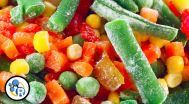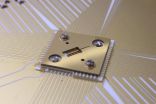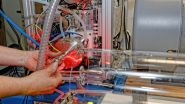Debunking 3 common food myths (video)
2015-05-26
(Press-News.org) WASHINGTON, May 26, 2015 -- You might have heard that microwaving your food is dangerous. Maybe your health nut friend told you that eating frozen veggies is less healthful than eating fresh ones. Is a glass of red wine really good for your heart? This week, Reactions is here to sort out the "old wives' tales" from the facts, taking on a swath of food myths. Check out the videos here: http://bit.ly/ACSFoodMyths.
Subscribe to the series at http://bit.ly/ACSReactions, and follow us on Twitter @ACSreactions to be the first to see our latest videos.
INFORMATION:
The American Chemical Society is a nonprofit organization chartered by the U.S. Congress. With more than 158,000 members, ACS is the world's largest scientific society and a global leader in providing access to chemistry-related research through its multiple databases, peer-reviewed journals and scientific conferences. Its main offices are in Washington, D.C., and Columbus, Ohio.
To automatically receive news releases from the American Chemical Society, contact newsroom@acs.org.
Follow us: Twitter Facebook
[Attachments] See images for this press release:

ELSE PRESS RELEASES FROM THIS DATE:
2015-05-26
CLEMSON, S.C. -- If you've been to the doctor, you probably know what to do when you're handed a plastic cup and shown to the bathroom.
Most patients hand over the sample and give little thought to what happens when it's shipped to the lab for analysis.
Ken Marcus and his students are the exceptions. They have developed a new testing method that they believe will reduce costs, get faster results and lower the volume of urine needed for a sample.
Marissa Pierson, a master's student, closes the lid on a centrifuge while working in a Clemson University lab with Ken Marcus.
It's ...
2015-05-26
This news release is available in German.
Quantum physics is full of fascinating phenomena. Take, for instance, the cat from the famous thought experiment by the physicist Erwin Schrodinger. The cat can be dead and alive at once, since its life depends on the quantum mechanically determined state of a radioactively decaying atom which, in turn, releases toxic gas into the cat's cage. As long as one hasn't measured the state of the atom, one knows nothing about the poor cat's health either - atom and kitty are intimately "entangled" with each other.
Equally striking, ...
2015-05-26
This news release is available in German.
Leipzig / Helsinki. A first global scale study has estimated how forest emitted compounds affecting cloud seeds via formation of low-volatility vapours. According to the latest projections, terrestrial vegetation emits several million tons of extremely low-volatility organic compounds (ELVOCs) per year to the atmosphere. These oxidation products of compounds such as monoterpenes results in an increase of condensing vapours that can further form cloud condensation nuclei over the continents and thus has an influence ...
2015-05-26
Montréal, May 25, 2015 - A team of researchers at the IRCM led by François Robert, PhD, uncovered a critical role for two proteins in chromatin structure. Their breakthrough, recently published in the scientific journal Molecular Cell, helps explain how DNA is organized in our cells. This discovery could lead to a better understanding of what causes certain types of cancer, such as lymphoma.
Dr. Robert and his team study chromatin, the structure composed of DNA and proteins that makes up chromosomes. Its main role is to package DNA molecules containing all the ...
2015-05-26
LOS ANGELES (May 26, 2015) - Biomedical researchers at Cedars-Sinai have invented a tiny drug-delivery system that can identify cancer cell types in the brain through "virtual biopsies" and then attack the molecular structure of the disease.
If laboratory research with mice is borne out in human studies, the results could be used to deliver nano-scale drugs that can distinguish and fight tumor cells in the brain without resorting to surgery.
"Our nanodrug can be engineered to carry a variety of drugs, proteins and genetic materials to attack tumors on several fronts ...
2015-05-26
Queen's University PhD student Matt Shultz is researching magnetic, massive stars, and his research has uncovered questions concerning the behaviour of plasma within their magnetospheres.
Drawing upon the extensive dataset assembled by the international Magnetism in Massive Stars (MiMeS) collaboration, led by Mr. Shultz's supervisor, Queen's professor Gregg Wade, along with some of his own observations collected with both the Canada-France-Hawaii Telescope and the European Southern Observatory's Very Large Telescope, Mr. Shultz is conducting the first systematic population ...
2015-05-26
Washington, D.C. -- May 26, 2015 -- A new study has demonstrated that a protein called Niemann-Pick C1 (NPC1) is critical for the Ebola virus to infect a host. The study, published in the May/June issue of mBio, the online open-access journal of the American Society for Microbiology, suggests that drugs that block NPC1 could be used to treat this deadly disease.
"The science behind the concept of blocking the interaction between NPC1 and the virus is solid. Now, it is just a matter of powering through and identifying drugs that can inhibit NPC1 and moving them forward," ...
2015-05-26
An international team including scientists from Albert Einstein College of Medicine of Yeshiva University and the U.S. Army Medical Research Institute of Infectious Diseases (USAMRIID) has identified the molecular "lock" that the deadly Ebola virus must pick to gain entry to cells. The findings, made in mice, suggest that drugs blocking entry to this lock could protect against Ebola infection. The study was published in today's edition of the online journal mBio.
The researchers found that the Ebola virus can't infect cells unless it first attaches to a host protein called ...
2015-05-26
By unlocking the secrets of a bizarre virus that survives in nearly boiling acid, scientists at the University of Virginia School of Medicine have found a blueprint for battling human disease using DNA clad in near-indestructible armor.
"What's interesting and unusual is being able to see how proteins and DNA can be put together in a way that's absolutely stable under the harshest conditions imaginable," said Edward H. Egelman, PhD, of the UVA Department of Biochemistry and Molecular Genetics. "We've discovered what appears to be a basic mechanism of resistance - to ...
2015-05-26
Mitsuyoshi Nakao, Director of the Institute of Molecular Embryology and Genetics in Kumamoto University and Associate Professor Noriko Saitoh revealed that a cluster of defined, non-coding RNAs are mechanistically involved in endocrine therapy resistance in human breast cancer cells. Furthermore, resveratrol, a kind of polyphenol, was found to repress these RNAs and inhibit the proliferative activity of breast cancer cells which had acquired resistance. The work was published in Nature Communications on April 29th, 2015.
Breast cancer is one of the most common types ...
LAST 30 PRESS RELEASES:
[Press-News.org] Debunking 3 common food myths (video)



